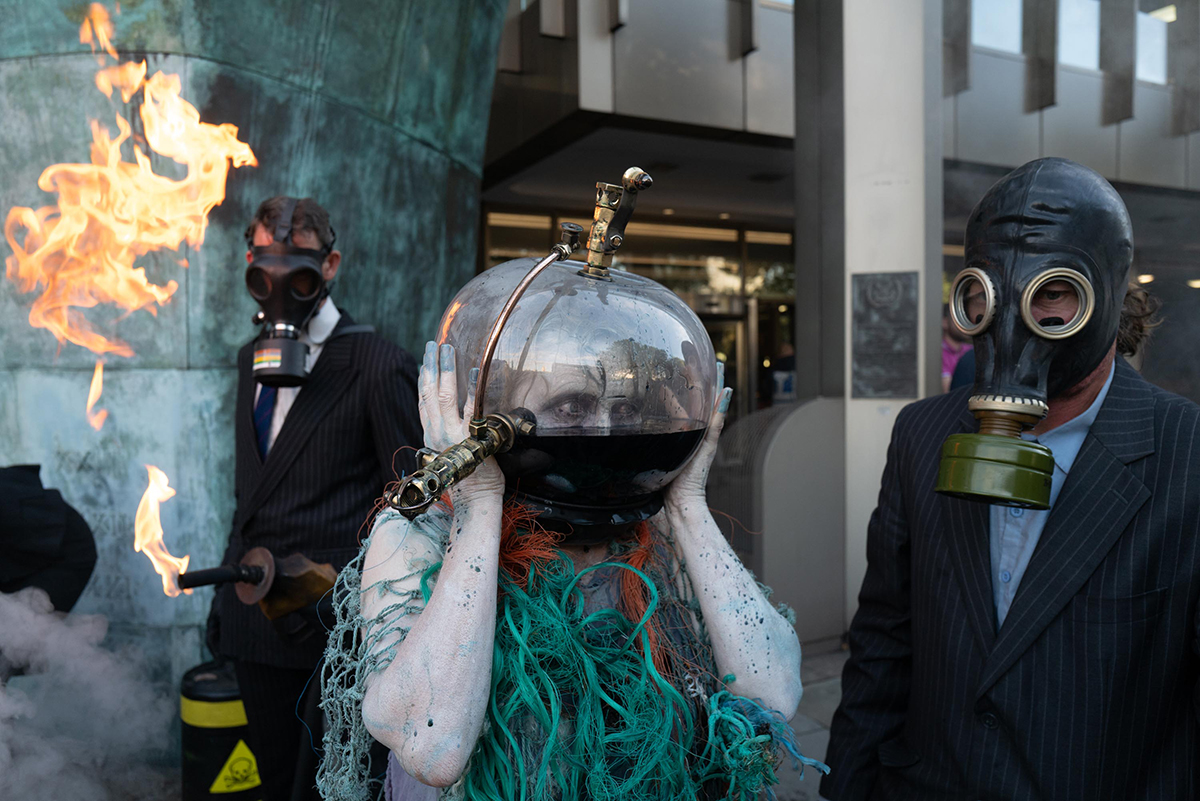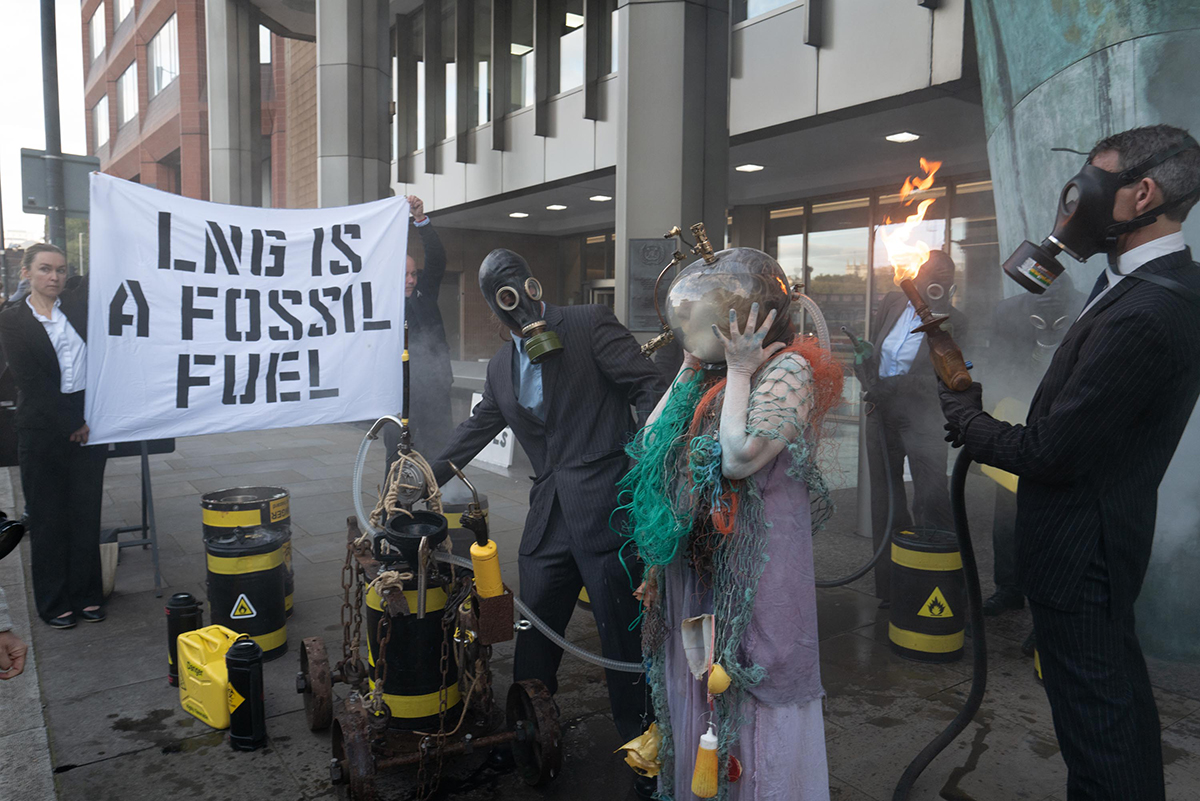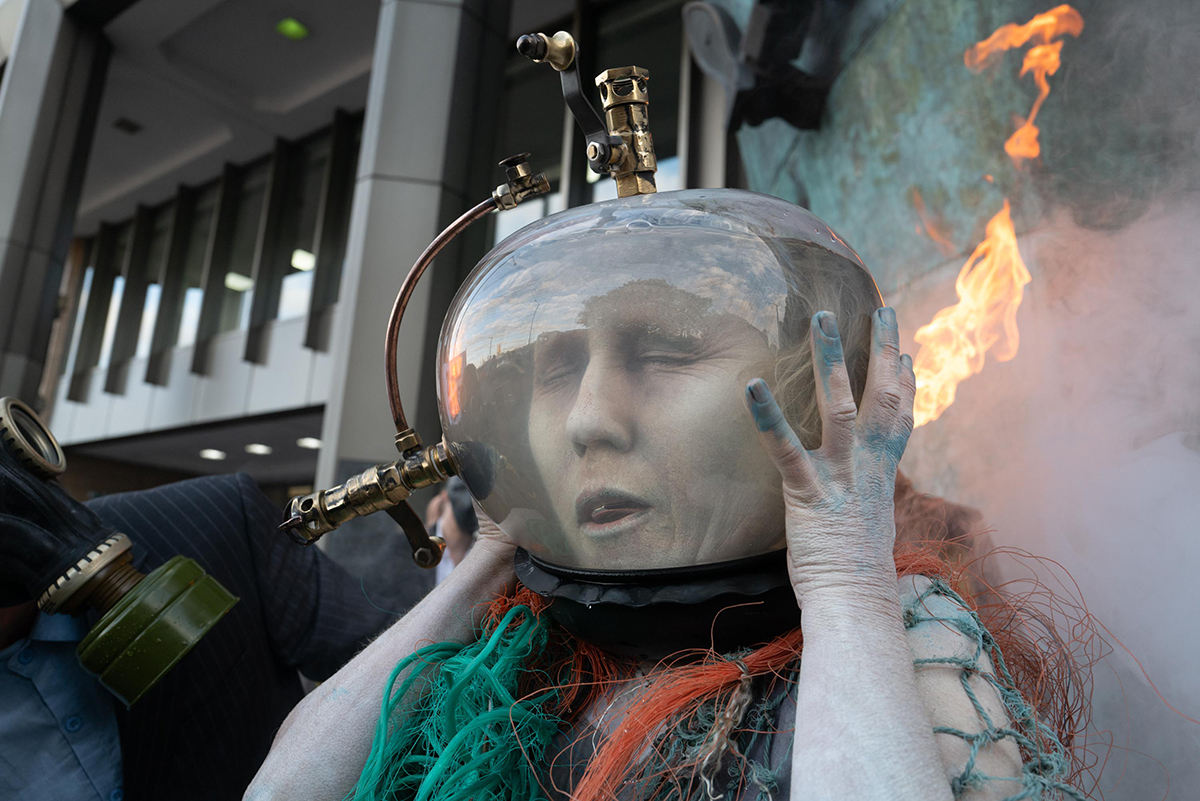ERTRINKEND IN LÜGEN
04.10.2024

Eine Meeresgöttin, die in Flüssiggas ertrinkt1Eine Wand aus Flammen und eine Gruppe mysteriöser Vertreter der Öl- und Gasindustrie - Ocean Rebellion schafft ein schauriges Tableau des Schmerzes, um das Greenwashing der Flüssigerdgas (LNG) von SEA-LNG und einige Mitgliedstaaten der Internationale Seeschifffahrtsorganisation der UN (IMO).
Neben dem Internationale Gedenkstätte für Seeleute auf dem Albert Embankment zeigten unsere Künstler eine beeindruckende neue Performance, die auf die schwere Krise der Schifffahrtsindustrie aufmerksam machen soll.

⬆️ Wenn der Helm sich füllt, stirbt die Göttin. Die schmutzigen Lügen von LNG treiben die IMO in den Abgrund Der Weg zur Hölle. Foto João Daniel Pereira.
Im Mittelpunkt der Aufführung stand das "Ertrinken" einer ozeanischen Göttin, deren Kopf in einem durchsichtigen Helm gefangen war, ein Fischglasgefängnis, das sich langsam mit dem Tod füllte. Gasmaskierte Figuren aus Shell LNG, ein Mitglied von SEA-LNG, füllten den Helm mit Hilfe von Maschinen langsam mit Flüssiggas und ließen ihn untergehen. Auf beiden Seiten schossen Flammen und Öl aus Düsen, die von den Öl- und Gasmanagern bedient wurden. Die Performance gipfelte in der vollständigen Versenkung der Göttin - eine Anklage gegen das Versagen der IMO beim Schutz der Ozeane, ihre fortgesetzte Manipulation durch die fossile Brennstoff- und Schifffahrtsindustrie und ein ergreifender Auftakt für den letzten Tag der Konferenz MEPC82 Treffen.
Das Schicksal des Ozeans hängt von uns allen ab.
Unsere Interventionen sind auf Ihre Unterstützung angewiesen.

⬆️ LNG ist ein fossiler Brennstoff, so einfach ist das. Foto João Daniel Pereira.
Indem sie sich hinter Berichten über bioLNG verstecken, SEA LNG war sehr erfolgreich darin, LNG als grünen Kraftstoff zu verkaufen, obwohl Bio-LNG teuer und selten ist (was bedeutet, dass fossiles LNG das Gas der Wahl ist) und immer noch zu Methanemissionen in seinem gesamten Lieferkette und Verwendung.
Sie waren so erfolgreich, dass Unternehmen wie Maersk, Königliche Karibikund MSC wurden Werbung für ihre Schiffe als "grün" zu bezeichnen und diese Lüge der breiten Öffentlichkeit zu verkaufen. LNG ist kein grüner Kraftstoff. Auch die IMO ist von dieser Lüge überzeugt und unternimmt nichts, um zu verhindern, dass LNG zum fossilen Brennstoff der Wahl für die Schifffahrt wird. Allein in der Europäischen Union hat sich der LNG-Verbrauch durch Schiffe von 2,2 Millionen Tonnen (Mt) im Jahr 2018 auf 4,4 Mt im Jahr 2022 verdoppelt. Die Akzeptanz von LNG beruht auf der trügerischen Vorstellung, dass es sich um einen alternativen, sauberen Brennstoff handelt. Hier betreiben die Befürworter von LNG Gaslighting und täuschen den maritimen Sektor und uns alle.
Gaslighting ist eine Form der psychologischen Manipulation, die darauf abzielt, Zweifel an der eigenen Wahrnehmung und Vernunft zu wecken, oft durch Verzerrung von Fakten oder der Realität. LNG-Fans wenden Gaslighting-Taktiken an, wie die Finanzierung von Forschung und das selektive Zitieren von Studien, die ihre Darstellung unterstützen und diskreditiert gleichzeitig Forscher, die auf die Risiken von LNG hinweisen. Sie untergraben auch abweichende Stimmen aus der Gemeinschaft und Meinungsführer, indem sie sie als "Alarmisten" oder "Obstruktionisten" abstempeln.

⬆️ Gaslighting durch SEA-LNG ist sowohl irreführend als auch potenziell rechtswidrig für die Mitglieder, da die FCA in ihren jüngsten Vorschriften fordert Die Dienstleistungen sind genau beschrieben.. Foto João Daniel Pereira.
Durch die Mitgliedschaft bei SEA-LNG Unternehmen wie Shell LNG, Lloyd's Register und Maersk betreiben Gaslighting, obwohl sie Nachhaltigkeit versprechen. Dies könnte gegen ihre rechtliche Verantwortlichkeiten und riskieren Rechtsstreitigkeiten, wenn diese wesentlichen Risiken, einschließlich des Prozessrisikos, in ihren geprüften Abschlüssen nicht ordnungsgemäß wiedergegeben sind. Gleiches gilt, Kreditrating-Agenturen die dieses Greenwashing nicht erkennen, geben auch ihren Abonnenten im Finanzsektor keine genauen Informationen über die Nachhaltigkeit.
Ganz zu schweigen von der Nichteinhaltung der ethischen Verantwortung gegenüber weiteren Interessengruppen, um einen Zusammenbruch des Klimas, der Natur und der Gesellschaft durch flüchtige Methan- und fossile Kohlenstoffemissionen zu vermeiden, die durch LNG entstehen. LNG ist keineswegs sauber, sondern einer der schmutzigsten Kraftstoffe, die es gibt. Es als sauberen Brennstoff anzupreisen ist eine technologische Lüge.

⬆️ Die Meeresgöttin nimmt einen letzten Atemzug, bevor sie der giftigen Mischung aus fossilem und biologischem Flüssiggas erliegt. Foto João Daniel Pereira.
Flüssigerdgas (LNG) - die Fakten
LNG ist ein fossiler Brennstoff, der bei der Förderung, dem Transport und der Verbrennung als Schiffskraftstoff Methan in die Atmosphäre entweichen lässt - ein gefährliches Gas, das die globale Erwärmung beschleunigt. 80-mal mehr Klimaerwärmung kurzfristig als Kohlendioxid.
Der Zwischenstaatliche Ausschuss für Klimaänderungen der UN (IPCC) identifiziert rasche Verringerung der Methanemissionen als eine der obersten Prioritäten, um die globale Erwärmung auf möglichst 1,5°C zu begrenzen. Der Bericht des IPCC jüngster Bericht Die Konzentration auf den Klimaschutz macht deutlich, dass fossiles Gas in Form von LNG keine Lösung für die Dekarbonisierung der Schifffahrt ist.
Entgegen den Anforderungen der Klimawissenschaft haben die Schifffahrts- und Hafenunternehmen mit Volldampf in die falsche Richtung gearbeitet, kräftig investierend mit fossilem LNG betrieben werden, da dieser Treibstoff die Umwelt- und Klimabelastung verringern wird. Derzeit sind weltweit über 785 neue Frachtschiffe in Auftrag gegeben, von denen über 400 für den Betrieb mit fossilem LNG gebaut werden.
Die Verbrennung von mehr fossilem LNG an Bord von Schiffen ist für unseren Planeten eine Katastrophe, die sich anbahnt. Es würde nur die Methanemissionen von Schiffen erhöhen, die bereits Rose nach Angaben der Internationalen Seeschifffahrtsorganisation der UN (IMO) zwischen 2012 und 2018 um 150%.
Methanemissionen verschlechtern auch die Luftqualität, und die steigende Nachfrage nach LNG - auch in der Schifffahrt - führt zu nachteiligen Auswirkungen an Land, wie z. B. verschmutztes Trinkwasser, geringere Ernteerträge und höhere vorzeitige Sterberaten.

⬆️ Ein verkleideter Gasmanager von Shell LNG demonstriert, wie LNG-Fackeln passieren (die ganze Zeit) mit einer Ölpumpe. Foto João Daniel Pereira.
Wir brauchen strenge Methanvorschriften bei der IMO
Nach Angaben der IPCC (AR6)Um den Klimanotstand und seine verheerenden Auswirkungen auf die Menschen zu bekämpfen, müssen die Methanemissionen in naher Zukunft dringend angegangen werden. Die Befürworter von LNG täuschen die politischen Entscheidungsträger über das wahre Ausmaß der Klima- und Gesundheitsauswirkungen von LNG und gefährden gleichzeitig eine lebenswerte Zukunft auf diesem Planeten.
Die Internationale Seeschifffahrtsorganisation ist das Gremium der Vereinten Nationen, das die internationale Schifffahrt regelt. Derzeit gibt es keine spezifischen internationalen Vorschriften für Methanemissionen von Schiffen.
Aufruf zum Handeln bei der IMO:
LNG ist ein fossiler Brennstoff, der in jeder Phase seines Lebenszyklus negative Auswirkungen auf Mensch, Umwelt und Klima hat.
Wir fordern:
1. Die Mitgliedstaaten der IMO erkennen diese Tatsache an und hören nicht mehr auf die SEA LNG Lobbyisten.
2. Alle Unternehmen, die an der Förderung von LNG beteiligt sind, werden daraufhin überprüft, ob dies einen Verstoß gegen ihre ökologischen Nachhaltigkeitsziele darstellt.
3. Die IMO zur Förderung der Effizienz und des Einsatzes von Segel- und elektrisch betriebene Schiffe durch Anreize für die Aufnahme von Tätigkeiten im Schifffahrtssektor, die Befähigung und Höherqualifizierung von Arbeitnehmern und die Einführung gerechterer Schifffahrtswege.


⬆️ Die Welt stirbt vor unseren Augen. Foto João Daniel Pereira.
1. Im Gegensatz zu SEA-LNG lügen wir nicht über das, was wir tun. Wir haben kein LNG verwendet, um die Seegöttin zu ertränken - das wäre Mord. Stattdessen haben wir harmloses Wasser verwendet.